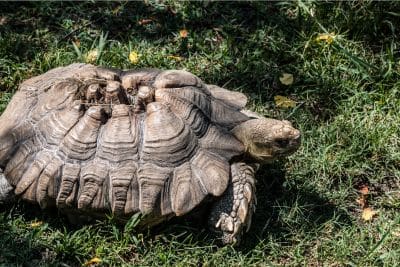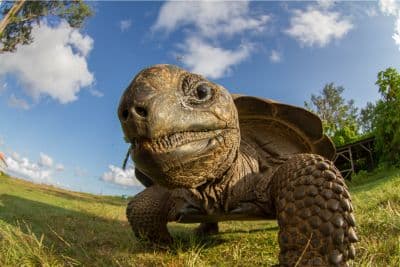When you’re new to keeping tortoises, you quickly learn that monitoring your pet’s bathroom habits is part of responsible care. Your tortoise’s poop tells you a lot about their overall health, and knowing what unhealthy tortoise poop looks like can help you catch problems early.
But here’s the thing: not every weird-looking poop is an emergency. Sometimes your tortoise eats something colorful and produces rainbow droppings the next day. Other times, unhealthy tortoise poop signals a real problem that needs veterinary attention.
So how do you tell the difference? Let’s break down exactly what healthy and unhealthy tortoise poop looks like, what causes problems, and what steps you should take when something seems off.
- What Does Healthy Tortoise Poop Look Like?
- The Most Common Types of Unhealthy Tortoise Poop
- What Causes Unhealthy Tortoise Poop?
- What To Do When You Notice Unhealthy Tortoise Poop
- Veterinary Treatment for Unhealthy Tortoise Poop
- Preventing Unhealthy Tortoise Poop
- When Unhealthy Tortoise Poop Is an Emergency
- Understanding Your Individual Tortoise's Normal
- The Bottom Line on Tortoise Digestive Health
- Ready to Give Your Tortoise the Best Care Possible?
- Citations
What Does Healthy Tortoise Poop Look Like?
Before we dive into unhealthy tortoise poop, you need to know what normal looks like for comparison.
Healthy tortoise poop is generally well-formed but slightly moist. The color ranges from dark brown to black, sometimes with a greenish tint depending on what your tortoise has been eating. You’ll often see bits of undigested plant material like grass, seeds, or flower petals mixed in, which is completely normal.
You might also notice white or cream-colored material coming out of your tortoise’s cloaca. Don’t worry, this isn’t unhealthy tortoise poop. These are called urates, and they’re basically the solid part of tortoise urine. Healthy urates look like thick paste or chalk and usually come out with a good amount of liquid urine.
Tortoises typically pass urates right before or immediately after drinking water, though they can also come out during regular defecation.
Keep in mind that normal poop varies slightly based on diet, hydration, and species. A tortoise eating lots of dark greens will have darker poop than one munching on lighter foods. Individual tortoises also have their own “normal,” so get familiar with what’s typical for your specific pet.

The Most Common Types of Unhealthy Tortoise Poop
Now let’s get into the warning signs. Unhealthy tortoise poop comes in several forms, and each one points to different potential problems.
Diarrhea or Watery Stool
This is one of the most common forms of unhealthy tortoise poop you’ll encounter. While tortoise poop should be slightly moist, it should still hold its shape. True diarrhea looks runny, soupy, or completely liquid.
Diarrhea can indicate several issues:
Stress is a surprisingly common culprit, especially in newly acquired tortoises or after environmental changes. A new enclosure, different temperature, or even too much handling can trigger stress-related diarrhea.
Dietary problems often show up as loose stool. Too much fruit, sudden diet changes, or foods your tortoise can’t tolerate will all produce watery poop. Some tortoises are particularly sensitive to certain vegetables or commercial foods.
Parasites or bacterial infections are more serious causes that need veterinary treatment. These often come with other symptoms like lethargy or loss of appetite.
Visible Worms in the Feces
Finding worms in your tortoise’s poop can be alarming, but it’s actually not uncommon, especially with wild-caught animals. Most tortoises carry some intestinal parasites at low levels that don’t cause problems.
However, visible worms in the feces suggest a heavy parasite load that needs treatment. The most commonly seen parasites include roundworms, which look like small white threads, and occasionally segments of tapeworms.
A healthy tortoise with proper nutrition can usually keep parasite numbers in check. When you start seeing unhealthy tortoise poop containing visible parasites, it typically means the infection has gotten out of control and your pet’s immune system is struggling.
This is where proper nutrition makes a real difference. Products like the Baby Sulcata Superfood Powder support immune function and digestive health, which helps tortoises maintain that important balance with normal gut flora and parasites.
Blood in Tortoise Stool
Seeing red streaks or spots in your tortoise’s poop is definitely concerning. Blood in the stool indicates irritation or damage somewhere in the digestive tract.
Several conditions cause bloody unhealthy tortoise poop:
Severe parasite infections can damage the intestinal lining enough to cause bleeding. This usually happens when worm loads get very heavy.
Gastritis or intestinal inflammation from bacterial infections, toxins, or eating something inappropriate can all produce blood in the stool.
Intestinal blockages from swallowed substrate, hard food items, or foreign objects can cause trauma that leads to bleeding.
Extreme stress can sometimes trigger digestive bleeding in tortoises, though this is less common than other causes.
Blood in the poop always warrants a veterinary visit. Don’t wait to see if it resolves on its own.
Unusual Colors
Oddly colored tortoise poop often freaks out new keepers, but it’s frequently harmless. The most common cause of colorful unhealthy tortoise poop is actually just colorful food.
Tortoises eating lots of red hibiscus flowers might produce reddish poop. Those munching on dandelions might have more yellow-green stool. Dark purple or blue poop can come from berries or certain vegetables.
Before panicking about weird colors, think about what your tortoise ate in the last 24-48 hours. If you can trace the color back to a specific food, it’s probably fine.
However, some color changes do signal problems. Very pale, clay-colored poop might indicate liver issues. Consistently black, tar-like stool (different from normal dark brown) could suggest bleeding higher up in the digestive tract.
When in doubt about color changes you can’t explain with diet, get your vet’s opinion.
Are You Starving Your Tortoise?
Save 10% on premium tortoise food and supplements from Tortoise Resource Center on Amazon now using code BUYNOWGET10
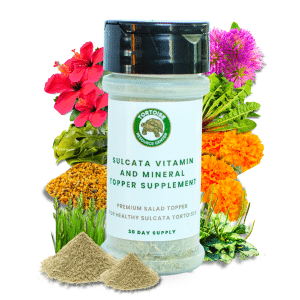
Sulcata Vitamin & Mineral Topper Supplement
30-Day Supply | 2 oz (56 g)
$24.99
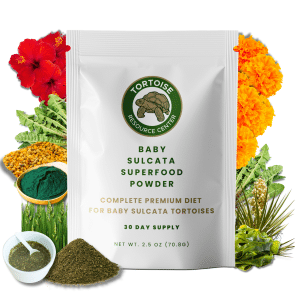
Baby Sulcata Tortoise Superfood Powder
30-Day Supply | 2.5 oz (70.8 g) Bag
$24.99
Rock-Hard, Dry Urates
Remember those white urates we talked about earlier? In a healthy, hydrated tortoise, they should be paste-like or slightly chalky. When urates come out looking like hard, dry rocks or pebbles, your tortoise is dehydrated.
This type of unhealthy tortoise poop is actually more about the urates than the feces themselves. Hard, crusty urates mean your pet isn’t getting enough water.
The fix is usually straightforward: increase soaking frequency and duration. Most tortoises should soak for 20-30 minutes several times per week, and dehydrated individuals may need daily soaks until their urates normalize.
Proper mineral balance also supports healthy hydration and urate formation. The Vitamin and Mineral Topper helps ensure your tortoise is getting the right balance of nutrients that support proper kidney function and hydration.
Strange Smells
Healthy tortoise poop never smells pleasant, but it shouldn’t smell truly awful either. Normal poop has an earthy, slightly vegetal odor that’s not particularly offensive.
Unhealthy tortoise poop often has a distinctly bad smell. Bacterial infections typically produce feces with a sour, acrid, or putrid odor that’s much stronger than normal. Some keepers describe it as smelling rotten or like decay.
If your nose tells you something’s wrong, trust that instinct. Foul-smelling poop often accompanies other symptoms like diarrhea or unusual color, and it’s worth investigating.
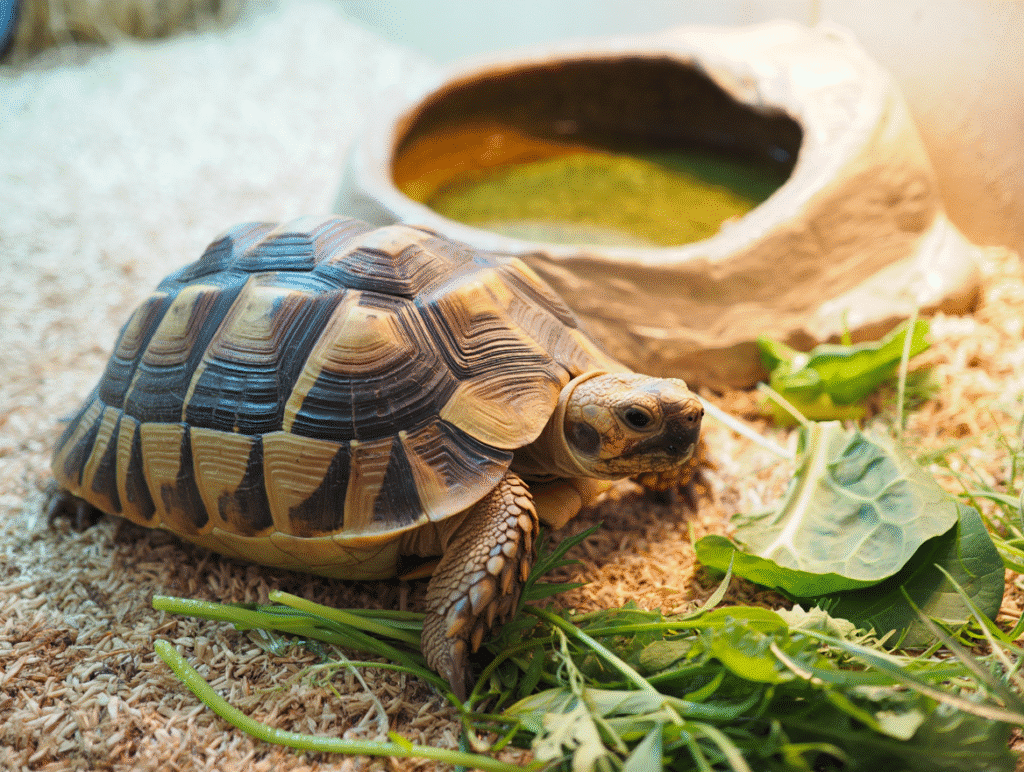
What Causes Unhealthy Tortoise Poop?
Understanding why tortoises develop fecal problems helps you prevent issues and respond appropriately when they occur.
Diet is the number one factor in digestive health. Tortoises need high-fiber, low-protein diets based primarily on appropriate grasses and leafy greens. Too much fruit, the wrong vegetables, or inappropriate protein sources all trigger digestive upset.
Hydration status affects both regular feces and urates. Dehydrated tortoises struggle to pass normal stool and produce those hard, rock-like urates that signal problems.
Parasites are common in tortoises but become problematic when loads get too heavy. Wild-caught animals almost always have parasites, and even captive-bred tortoises can pick them up from contaminated substrate or other animals.
Bacterial or fungal infections can develop from poor husbandry, contaminated food or water, or exposure to pathogens. Dirty enclosures increase infection risk significantly.
Stress impacts the digestive system more than many keepers realize. Temperature fluctuations, inadequate hiding spots, too much handling, or aggressive cage mates all create stress that shows up as unhealthy tortoise poop.
Temperature problems directly affect digestion. Tortoises that are too cold can’t digest food properly, leading to impacted food, fermentation, and abnormal feces. Consistent appropriate temperatures are essential.
Substrate impaction happens when tortoises accidentally (or deliberately) eat substrate materials that can’t be digested. Sand, gravel, and certain plant-based substrates all pose impaction risks.
What To Do When You Notice Unhealthy Tortoise Poop
Discovering that your tortoise has abnormal poop isn’t always an emergency, but it does require action. Here’s your step-by-step response plan.
Collect a Sample
Your first move should be to collect the unhealthy tortoise poop sample. Place it in a small plastic bag or clean container and store it in a cool location (a refrigerator works fine).
Not every case will require fecal testing, but having a sample ready means you won’t have to wait if your vet wants to analyze it. Fresh samples give the most accurate test results, so collect it as soon as possible after your tortoise defecates.
Keep the sample until your vet tells you to discard it or until you’re confident your tortoise is healthy again.
Review Recent Diet
Before you panic, think through everything your tortoise ate over the past few days. Many cases of concerning-looking poop trace back to something they ate.
Did you introduce any new foods recently? Offer fruit as a treat? Give them access to plants you don’t normally provide? Sometimes seeds from fruits pass through mostly intact and look alarming in the feces.
Colorful foods are the most common cause of unnecessarily worrying owners about unhealthy tortoise poop that’s actually harmless.
Separate from Other Tortoises
If your tortoise shares an enclosure with others, separate them immediately. Many conditions that cause unhealthy tortoise poop are contagious, including parasites and bacterial infections.
Keeping the affected tortoise isolated protects your other animals and makes monitoring and treatment easier. You’ll know exactly whose poop you’re looking at, and you can ensure the sick animal gets proper care.
You can reintroduce them once your vet confirms the problem isn’t contagious or after treatment is complete.
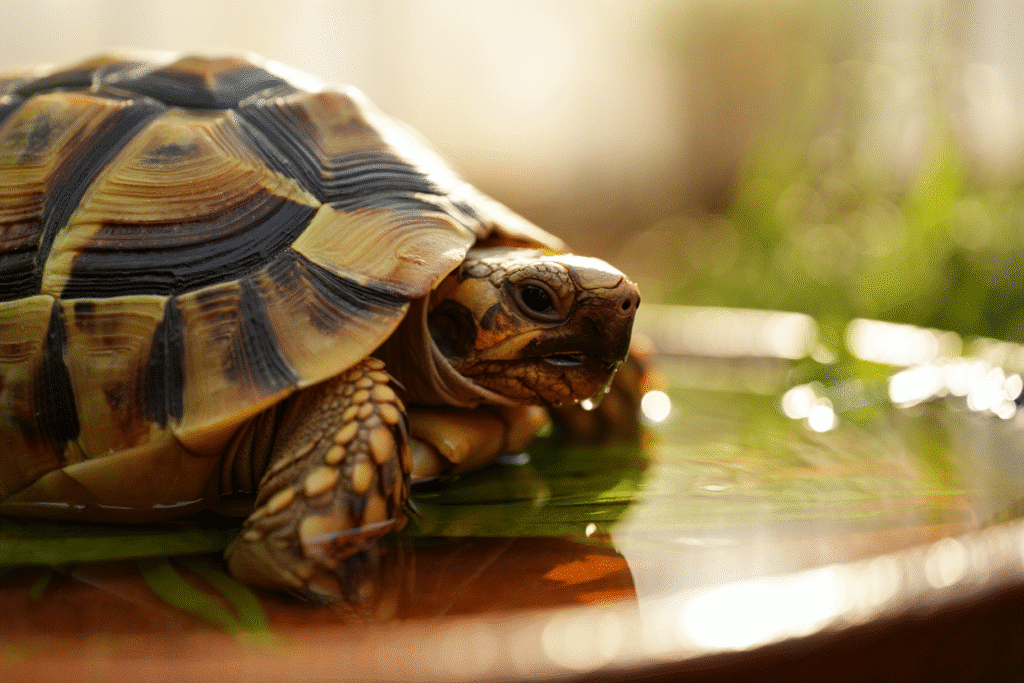
Check for Other Symptoms
Digestive problems rarely occur in isolation. Look your tortoise over carefully for other signs of illness that might help identify the underlying cause.
Check for:
- Lethargy or decreased activity
- Loss of appetite or refusing food
- Swollen or puffy eyes
- Nasal discharge or bubbles
- Labored breathing
- Weight loss
- Shell abnormalities or soft spots
- Limping or weakness
Document any additional symptoms you notice. This information helps your vet make an accurate diagnosis.
Clean the Enclosure Thoroughly
Parasites and pathogens in unhealthy tortoise poop can reinfect your pet if they contact contaminated surfaces or substrate. A thorough cleaning reduces this risk.
Mix a 5% bleach solution (about 3/4 cup bleach per gallon of water) and use it to disinfect all surfaces in the enclosure. Scrub water dishes, hide boxes, and any decorations or furniture.
Rinse everything extremely thoroughly with clean water. Bleach residue is toxic to tortoises, so multiple rinses are essential. Let everything air dry completely before returning your tortoise to the enclosure.
Consider removing the existing substrate entirely and replacing it with paper towels or newspaper temporarily. This makes it easy to monitor future poops and collect samples if needed, plus it maintains better hygiene during recovery.
Contact Your Veterinarian
This is the most important step. Call your vet whenever you notice unhealthy tortoise poop, even if your pet seems fine otherwise.
Your vet might want to see your tortoise immediately, especially if there’s blood in the stool or if your pet shows other concerning symptoms. In other cases, they may recommend monitoring at home for a few days to see if the problem resolves.
Be ready to describe:
- What the abnormal poop looks like
- When you first noticed the problem
- What your tortoise has been eating
- Any other symptoms you’ve observed
- Your tortoise’s recent history (new enclosure, temperature changes, etc.)
Don’t try to diagnose and treat serious problems at home. While some minor digestive upset resolves on its own, many causes of unhealthy tortoise poop require veterinary treatment.
Withhold Food Temporarily
Giving your tortoise’s digestive system a rest can help in many cases. Withholding food for 24 hours allows the gut to settle and can help with both diarrhea and minor digestive upset.
This temporary fast won’t harm an otherwise healthy tortoise. In the wild, tortoises regularly go days without eating due to weather, seasonal changes, or simple lack of available food.
However, if your tortoise is already showing signs of illness beyond just abnormal poop, check with your vet before withholding food. Sick or weakened animals may need consistent nutrition to recover.
Continue offering fresh water during the fasting period. Hydration remains important even when food is restricted.
Provide a Soaking Session
A 20-30 minute soak in lukewarm water helps in several ways. Many tortoises will defecate during or shortly after soaking, which can provide relief if they’re uncomfortable. Soaking also ensures your pet stays hydrated, which is crucial for recovery from digestive problems.
Use room temperature or slightly warm water that comes up to about shell height on your tortoise. Never use hot water, as it can cause stress or burns.
If your tortoise defecates during the soak, remove them immediately and change the water. You don’t want them drinking contaminated water or sitting in it longer than necessary.
Some tortoises also drink during soaks, which helps with overall hydration and can soften dry urates.
Monitor Closely Over Several Days
After taking these initial steps, watch your tortoise carefully for the next few days. Keep detailed notes about their behavior, appetite, and subsequent bowel movements.
Document each time they defecate and what it looks like. Note whether the unhealthy tortoise poop is improving, staying the same, or getting worse. Track their appetite and activity levels daily.
This information becomes valuable if you need to return to the vet or if the problem doesn’t resolve. Patterns in symptoms can help identify the underlying cause.
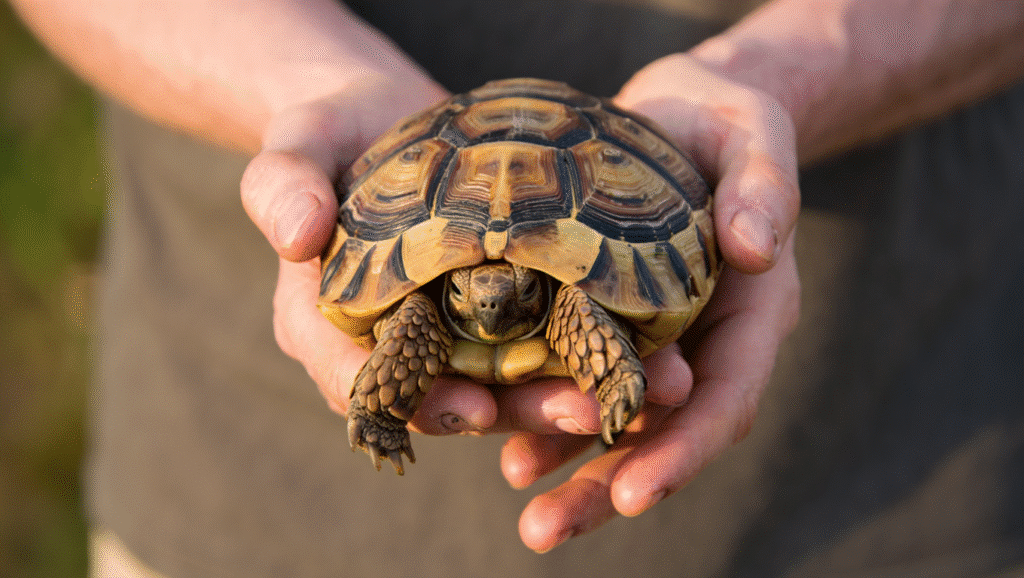
Veterinary Treatment for Unhealthy Tortoise Poop
While home care helps with minor issues, many causes of abnormal poop require professional treatment. Here’s what your vet might recommend.
Fecal analysis is usually the first diagnostic step. Your vet examines the stool sample under a microscope to check for parasite eggs, larvae, or adult parasites. They may also culture the sample to identify bacterial infections.
Antiparasitic medications or dewormers treat intestinal parasites. Different parasites require different medications, which is why proper diagnosis through fecal testing is essential. Common deworming medications for tortoises include fenbendazole and metronidazole.
Antibiotics address bacterial infections. Your vet will choose the appropriate antibiotic based on culture results when possible, or they may start with a broad-spectrum antibiotic while waiting for test results.
X-rays or other imaging help diagnose blockages or impactions. If your vet suspects your tortoise swallowed substrate or has an intestinal obstruction, imaging reveals the problem’s location and severity.
Surgery becomes necessary for severe blockages that won’t pass on their own. While tortoise surgery is serious, it can be life-saving when impaction threatens your pet’s life.
Fluid therapy treats dehydration, especially after prolonged diarrhea. Your vet may give subcutaneous fluids (injected under the skin) or in severe cases, may need to provide IV fluids.
Dietary recommendations often accompany other treatments. Your vet might suggest specific foods to avoid or recommend particular supplements to support recovery and prevent future problems.
Preventing Unhealthy Tortoise Poop
Prevention is always easier than treatment. These practices significantly reduce your tortoise’s risk of developing fecal problems.
Provide a proper diet based on your species’ specific needs. Most tortoises need high-fiber, low-protein foods like grasses, weeds, and dark leafy greens. Limit fruit to occasional treats or avoid it entirely for certain species.
Ensure consistent hydration through regular soaking and constant access to fresh water. Most tortoises benefit from soaking 2-3 times per week, and some species need daily soaks.
Maintain appropriate temperatures in your tortoise enclosure. Each species has specific temperature requirements, and consistent heat is essential for proper digestion. Use reliable thermometers and thermostats to monitor conditions.
Practice good hygiene in the enclosure. Remove feces daily, clean water dishes regularly, and do thorough enclosure cleanings at least monthly. Dirty environments breed bacteria and parasites.
Choose safe substrate that won’t cause impaction if accidentally ingested. Avoid sand, fine gravel, and other materials that can compact in the digestive tract. Grass, topsoil mixed with sand, or large river rocks work better for most species.
Quarantine new arrivals for at least 60-90 days before introducing them to existing tortoises. This prevents spreading parasites or diseases to your established pets.
Schedule regular veterinary checkups including annual fecal exams. Catching parasite loads or other problems early makes treatment easier and prevents serious complications.
Minimize stress through proper husbandry. Provide adequate hiding spots, avoid excessive handling, maintain stable conditions, and ensure tank mates are compatible.
Supplement appropriately to fill nutritional gaps. Even with excellent husbandry, it’s difficult to provide every nutrient tortoises need through diet alone. Quality supplements support immune function and digestive health.
When Unhealthy Tortoise Poop Is an Emergency
Most cases of abnormal poop aren’t immediate emergencies, but certain situations require urgent veterinary care.
Seek emergency treatment if your tortoise shows:
- Significant amounts of bright red blood in the stool
- Complete inability to defecate despite straining (especially if the belly appears swollen)
- Profuse, watery diarrhea lasting more than 24 hours
- Abnormal poop combined with severe lethargy, refusing to move, or inability to lift their head
- Prolapse (tissue protruding from the cloaca)
- Signs of pain like vocalizing, thrashing, or extreme restlessness
- Abnormal poop along with obvious neurological symptoms like tremors or inability to coordinate movement
Trust your instincts. If something feels seriously wrong with your tortoise, don’t wait. It’s always better to check with your vet and be told everything’s okay than to wait too long with a genuine emergency.
Understanding Your Individual Tortoise’s Normal
Every tortoise has their own baseline normal. Learning what’s typical for your specific pet helps you recognize problems faster.
When you first get a tortoise, pay attention to their regular bathroom habits. How often do they poop? What does it typically look like? How much urine and urates do they pass? What time of day do they usually defecate?
Some tortoises poop daily, others every few days. Some produce darker feces, others lighter. Individual patterns vary, and what’s normal for one tortoise might be unusual for another.
Keep a log during the first few months if you’re new to tortoise keeping. Note each bowel movement along with what they ate that day. This creates a baseline you can reference later when something seems off.
As you become more familiar with your tortoise’s habits, you’ll quickly recognize when unhealthy tortoise poop appears. That familiarity with normal makes identifying problems much easier.
The Bottom Line on Tortoise Digestive Health
Your tortoise’s poop provides valuable insights into their overall health. While unhealthy tortoise poop takes many forms – from diarrhea to blood in the stool to unusual colors – learning to recognize these warning signs helps you respond appropriately.
Not every abnormal poop requires panic, but all deserve attention. Sometimes the cause is as simple as a colorful meal or minor dietary adjustment. Other times, unhealthy tortoise poop signals parasites, infections, or other conditions that need veterinary treatment.
The key is knowing what to look for, taking appropriate action when problems arise, and maintaining excellent husbandry to prevent issues in the first place. With proper diet, hydration, temperature, and hygiene, most tortoises maintain healthy digestive function throughout their lives.
When problems do occur, don’t hesitate to contact your veterinarian. Early intervention prevents minor issues from becoming major health crises. Your tortoise depends on you to recognize when something’s wrong and get them the help they need.
Ready to Give Your Tortoise the Best Care Possible?
Join the Tortoise Resource Center community and get exclusive resources to help you provide top-notch care for your shelled friend.
When you subscribe to our email list, you’ll receive:
Save on Your Next Order – A coupon for a discount on premium tortoise food, supplements, and supplies
Free Ebook: “The Ultimate Guide to Tortoise Nutrition” – Learn exactly what to feed your tortoise, including comprehensive food lists, feeding schedules, and nutrition tips for optimal health
Access to “The Ultimate Sulcata Care Webinar” – Get in-depth guidance on habitat setup, diet management, and health care specifically for Sulcatas and other grassland tortoises
Exclusive Facebook Group Invite – Join our private Tortoise Resource Center Facebook community where you can share experiences, ask questions, and get support from fellow tortoise keepers and experts
Tortoise Growth Tracker Template – Download our professional template for logging weight, shell measurements, and health milestones to monitor your tortoise’s development and catch potential problems early
Click here to join and get instant access to these valuable resources →
Understanding what unhealthy tortoise poop looks like is just the beginning. With our comprehensive guides, expert webinar, and supportive community, you’ll have everything you need to keep your tortoise healthy for decades to come.
Citations
University of Munich – Urinalysis in Tortoises
The Tortoise Table – Signs of a Healthy Tortoise

